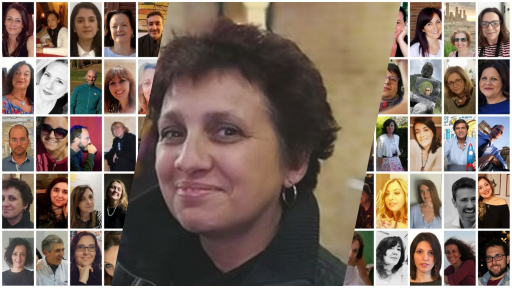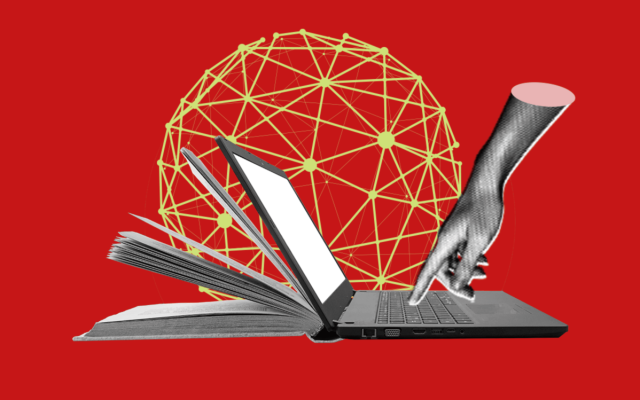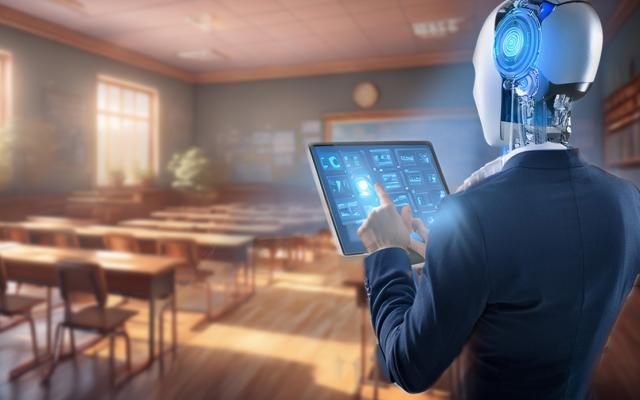Our weekly instalment on the “Our School” Professors takes us to Tuscany to meet Federica Tamburini, a primary school teacher, who lives and works in Viareggio at the Marco Polo Viani “Vera Vassalle” Primary School.

For over 20 years, Federica has been using technology in didactic activities to promote inclusion and develop the independence, creativity and soft skills of her students. She has also adopted the Teal Methodology of Indire’s “Avanguardie educative” and is the school coordinator for the method. For many years, she also conducted teacher training courses, both locally and nationally, on digital didactics and skills, especially educational robotics and immersive and augmented reality. She is a Level 2 Google Certified Educator and a MIE Expert, as well as Italian ambassador for several immersive reality apps and an active member of EPICT, an organisation that has been promoting and certifying the use pedagogic use of digital technology at school.
With a group of “Our School” professors, Federica has developed a course addressing the Agenda 2030 and especially water as a resource.
As usual, we share a short self-presentation video and then the interview with researcher Ilaria Gaudiello, who coordinates the works of the open source community of professors and educators.
INTERVIEW
Federica, what is your concept of “digital didactic experimentation” and how have you developed your mindset as an innovating teacher?
I believe I am an ante-litteram digital native! My father was a physicist, programmer and teacher who conducted research at the Faculty of Computer Science at the University of Pisa. My house was full of punch cards, programme printouts, keyboards and monitors that seemed magical to a child. Growing up, my father taught me the basics of programming and then I studied it on my own. My innate curiosity did the rest.
Then, in the early 90s, I began working with the Council that was organising courses for employees and citizens on the use of Office. So, when I became a teacher, it came naturally to extend this approach to children. Taking advantage of my experience as a head scout, I placed my students at the centre of an active and experiential method. Technology evolved very rapidly after the first hypertexts we developed in class in the nineties. However, my pedagogic idea always came before any new technology. Tools had to support the objectives, the more they adapted to the necessary skills, the better they were. In fact, I have been able to observe how the active use of technology promotes inclusion and helps students to develop independence, curiosity, teamwork, creativity and focus on and fully understand content, or everything that we now label as “soft skills.” There is no need for sophisticated tools, but teachers must pay close attention to how they introduce concepts and manage the class carefully. This, I believe, is true testing: looking for the strategies and tools that are best suited to helping students achieve their full potential.
About 12 years ago, as I was looking for tools to drive my pedagogic vision, I ran into the EPICT Standard (European Pedagogical ICT Licence), a European project (but not only) conceived for teachers who wish to focus – and certify – their pedagogic skills in the use of digital technology. Recently, I have also begun collaborating as a trainer in the courses organised by EPICT Italy at the University of Genoa and the EPICT Association. This allows me to meet teachers from around Italy and constantly discuss teaching methods and approaches, a true lifelong learning opportunity that helps me in my daily teaching activities.
In class, I have been applying the Teal Methodology which calls on students to develop transversal digital projects in teams. These can be presentations, digital texts or even e-books, videos and virtual or augmented reality content, as well as simple tinkering or robotic projects. This allows the students to address didactic content from a wider perspective through interdisciplinary and inclusive approaches that promote an experiential and multi-modal approach that is best for the different intelligences of each student.
As part of the Fondazione Mondo Digitale “Our School” Community, you developed an experimental course providing your experience to other teachers with complementary skills. Can you tell us about the course?
Together with my work group, composed of primary school teachers, we concentrated on a proposal that could exploit immersive reality to develop a course based on the Agenda 2030 and especially on water.
Our course, which is aimed at students aged 9-12, is organised as an escape room in which, following an initial visit to a virtual museum that introduces the subject, the students have to explore a series of proposals created through augmented reality to learn about concepts related to the importance of water and its safeguard. These range from the presence of water on our planet to the journey water takes to reach our houses, how to read mineral water labels, the extreme damage caused by climate change (flooding and desertification caused by global warming) and the artificial cycle of water on the space station. At each level, students are asked to search for data that will provide the key to the next level. Naturally, even the exit will be a virtual experience. At the end of the exploratory phase, the students will be asked to develop projects, allowing them to directly experience active reflection on the actions required to safeguard water and the environment, as well as to create digitally augmented objects.
It was a challenge to design varied activities that could be undertaken even by students without any experience of immersive didactics. In fact, although they present a significant didactic content, all the activities are easy to use (you just need a device and a couple of apps).
I discovered some fantastic colleagues. Our understanding and aims converged immediately. Each one of us shared their experience and together we developed a proposal that we are excited to share with other schools.
I experimented the course myself, this year, with my fifth-year class. It was met with great interest. Moreover, I understood how augmented and virtual reality could also be used to address delicate and important issues, allowing the students to learn significant concepts.
Looking to the future, how do you imagine the “Our School” Community in 2030?
I love the name of this community: Our School! It not only gives us a sense of belonging, but also conveys that it is a common good. It is ours and we must all contribute to it. This is the idea of school that I like! I wish school were truly considered a fundamental good and everyone participated with true passion. In parallel, I would like a school that is open to the local community, one in which the entire community could enjoy the facilities after school, a cultural site for everyone, not just as a school for students.
I believe that the Fondazione Mondo Digitale and its educational projects are working towards this end. I imagine – and hope – that, by the end of the decade, the Our School Community will be rooted and spread across Italy, contributing to making school livelier and more active, a place where learning is interesting and in which technology promotes learning processes and extends knowledge to everyone, involving teachers in an active and synergic network.


